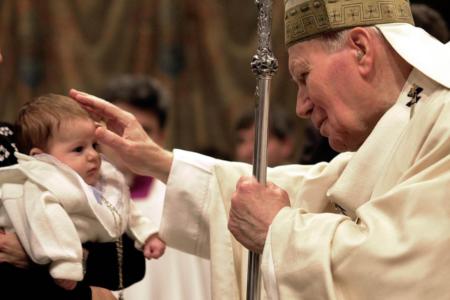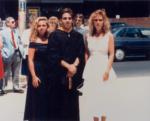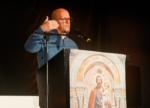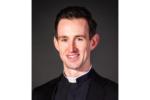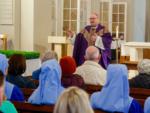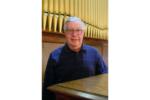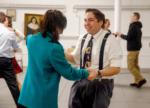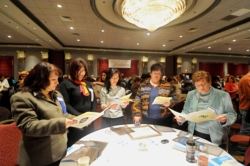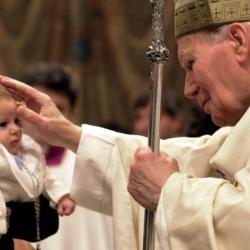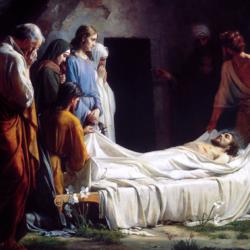Faith formation essential, catechists told at congress
RANDOLPH -- Prayer and continued faith formation needs to be central to the life of a catechist, both on a personal level and in teaching their students about the Catholic faith, speakers at an Oct. 24 archdiocesan conference on catechesis told participants.
The Archdiocese of Boston’s Office of Religious Education hosted its annual Catechetical Congress at the Lantana function hall. The conference attracted over 600 attendees, many of whom are involved in faith formation of young people and adults through their roles as catechists in parish faith formation programs, youth ministers, and Catholic school religion teachers. The meeting was bi-lingual, offering separate keynote addresses in both English and Spanish, and separate breakout sessions for speakers of both languages.
The conference opened with a multi-lingual prayer service led by Cardinal Seán P. O’Malley, which offered prayers in English, Spanish, Vietnamese, Portuguese, and Creole. Following the service, English and Spanish speakers adjourned to attend separate sessions.
Susan Kay, the assistant director for catechetical leadership in the religious education office of the archdiocese, presented the winners of the 2009 Sister Marion O’Connor, RC Award for Excellence in Catechetical Leadership. The winners were Frances Taylor, the religious education director at Sacred Heart Parish in Lynn and Sister Elisette Signor, MSCS, of the Brazilian apostolate at St. Anthony Parish in Allston.
The conference also honored Cardinal O’Malley for his 25th anniversary of his ordination as a bishop.
Joe Paprocki, a national consultant for faith formation for Loyola Press, a Catholic book publisher, was the keynote speaker for the English session. He has also published several books on catechesis and religious education. Paprocki is also an eighth-grade catechist at his home parish in Illinois.
Father Carlos Flor was the keynote speaker for the Spanish session. He is parochial vicar at Immaculate Conception Parish in Revere.
This year’s conference encouraged catechists to continually grow in their own knowledge and love of the faith, as well as use prayer in their personal lives and with their classes.
“To be a catechist is to know the faith, to love the faith, and to speak about the things of God with every opportunity -- to speak of God with faithfulness and love,” Cardinal O’Malley said in his opening remarks. “It’s not a matter of transmitting information but helping people to be part of a family. The role of a catechist is to be a mentor. It presupposes a message that is real.”
In her remarks, Janet Benestad, the archdiocese’s Secretary for Faith Formation and Evangelization, encouraged catechists to continue to read the Catechism of the Catholic Church and pray.
“No matter what we do, if we do not do it in prayer, it will not be the love of Christ that is communicated,” said Benestad.
“Religious education is something we are all called to do, that we as adults have an obligation to continue our own faith journey and our own adult education,” added Susan Abbott, Director of Religious Education for the archdiocese. “No one has learned everything yet and that goes for the knowledge of the faith and growing in the wholeness of life in prayer.”
“You’re a better painter when you paint a lot. You’re a better teacher when you learn a lot. You’re a better prayer when you pray a lot,” Abbott continued. “If we immerse ourselves in the culture of learning, praying, and faith, if it’s a part of the air that we breathe, and if it’s truly who we are, then we will certainly be better teachers.”
Paprocki echoed the importance of prayer in his own remarks.
“Prayer is such an important part of what we do as catechists,” he said. “Without it, our teaching can be rather vacuous, and it reduces teaching to a subject. You and I don’t teach a topic. We teach people.”
Paprocki said he spends 15 to 20-minutes of each 75-minute class leading his students in a reflection.
“It’s extremely helpful to them to have the quiet time,” he said. “It’s interesting. They fight it. On the other hand, they can’t sit still, so I have to quiet them down, but they love it too. They like that quiet time alone.”
In his classes, Paprocki said he attempts to connect the word of God to the lives of his students.
His address entitled “Show ‘em the door: Catechesis that enters through their door but leaves through your door,” discussed six cultural characteristics of today’s youth, and explained how and what catechists need to teach today’s students given the world in which they live.
Father Flor spoke of the importance of the word of God to the catechist, describing the special relationship catechists need to have with scripture. He encouraged catechists to study and pray with the Bible.
“If I have a relationship with the Lord, I understand the Bible,” Father Flor said. “If I know the Bible, I know myself better.”
“To preach means to preach the Good News, to preach the salvation that the Lord offers,” he added. “To me, catechesis is not simply a set of rules or a set of doctrines.”
Father Flor also said that tradition, with scripture, is essential in the life of the Church, and Catholics cannot separate the two.
Sister Tania Santander, CDP, Director of Religious Education at the Cathedral of the Holy Cross Parish, who attended Father Flor’s talk, agreed.
“We cannot separate scripture from tradition because we cannot fly with only one wing,” she said.
“Scripture is the beginning of everything,” she added. “Tradition is our way of life, and scripture enlightens our way of life.”
Sister Tania agreed with the importance of prayer and reflection in the life of the catechist, saying that catechists are taught to pray before teaching, as well as read and reflect on material presented in their lesson plans, so they can help students to put the essentials of the faith into practice.
Archdiocesan catechists have many ways that they incorporate prayer into their classes.
Martha Gleason, an eighth-grade catechist at St. Pius X Parish in Milton, opens her classes with a decade of the rosary.
“It gives you that time to get ready, settle in, and raise their minds to God and what we are there for,” Gleason added.
Michael Sullivan, who teaches a First Communion preparatory class at St. Ambrose Parish in Dorchester to a range of pupils from ages six to 13, uses the Our Father, Hail Mary and a prayer to the Holy Spirit. Since he holds class before Sunday Mass, he also discusses the readings of the day.
“By doing it, it also gives them a chance to bring prayer back to their house,” Sullivan said.
Liliana Patino, who teaches a Kindergarten class after Mass at Sacred Heart Parish in Malden, discusses the readings and homily of the day with the children.
“That is the daily meal,” said Patino. “I have to feed myself in order to feed them, and I need to gain more knowledge in order to give them knowledge. I need to know who I am in order to be there for them.”
